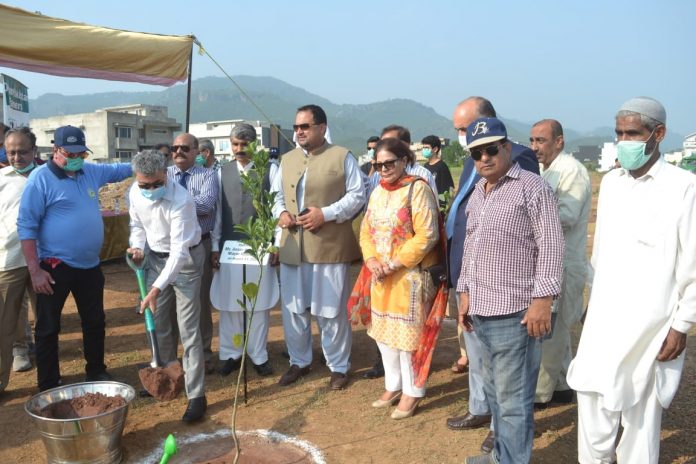DNA
Islamabad – First phase of the first ever public fruit garden completed on Thursday with plantation of two hundred saplings of a variety of fruit plants in connection with the Independence Day tree plantation. The first ever public fruit garden is being developed on Major Road-4 in the greenbelt of D-12/2, Islamabad.
Development Communications Network (Devcom-Pakistan) has launched this initiative in partnership with Metropolitan Corporation Islamabad (MCI), National Centre of Cleaner Production (NCPC), Islamabad Devcom Centennial Leo Club (IDCLC) and FM 100.
Senator Sitara Ayaz, Chairperson Senate Standing Committee on Climate Change, protection of trees is equally important as the plantation of trees itself. Citizens and communities shall play their role in both. She said all efforts are focused on plantation but we hardly see efforts in protection of green cover especially in our cities. She appreciated Devcom-Pakistan for launching the initiative of public fruit gardens. It has many benefits in one go, the public-private partnership, citizens’ monitoring and crops for communities.
Speaking on the occasion, Mayor Islamabad Anser Aziz Sheikh said the public-private partnership is a key to success for social change. Starved for financial resources, he said MCI needs the cooperation of civil society organizations and philanthropists to come up with green initiatives to make the federal capital more clean and green.
He appreciated Devcom-Pakistan for always coming up with new ideas to improve citizens’ engagement in making Islamabad a greener and cleaner city. He said MCI has very limited resources and we look forward to the federal government for increased funding to do the needful to improve the water and sanitation services, improve the green cover and healthy facilities.
The Public Fruit Garden is the brainchild of Devcom-Pakistan Executive Director Munir Ahmed. He said we need to promote this initiative by replicating it across Pakistan wherever the open spaces are available. The model is that it should be developed in public-private partnership, followed by community-based monitoring and ownership of the locals to ensure sustainability of the initiative.
He said “Every citizen needs to play a responsible role in making the cities sustainable. Authorities shall provide a suitable environment and working relationship to engage non-state actors to make the social sector development more inclusive.
Deputy Mayor Zeeshan Naqvi said the public fruit gardens’ idea was different one. With the support and leadership of Devcom-Pakistan, MCI would be developing more gardens in Islamabad, and we welcome other civil society organizations to be part of the initiative.
Irshad Ramay, the NCPC chief executive, said: plantation is easy but growing the plants in a sustainable way is the responsibility of the concerned departments. We can do one time investment and a bit of monitoring too, however, the actual responsibility of the authorities to make the social investments secure and safe for the sake of the enhanced environment.
IDCLC president Haares Munir noted that youth could play a crucial role in taking lead in the community-based green initiatives if supported and guided in the right direction. Its seven years now, IDCLC has been providing the young people with leadership opportunism to get engaged in the community services and local environmental improvement. Many projects have successfully completed besides ongoing campaigns including green neighborhood, grow a plant – own a tree, zero food waste and community empowerment.

















